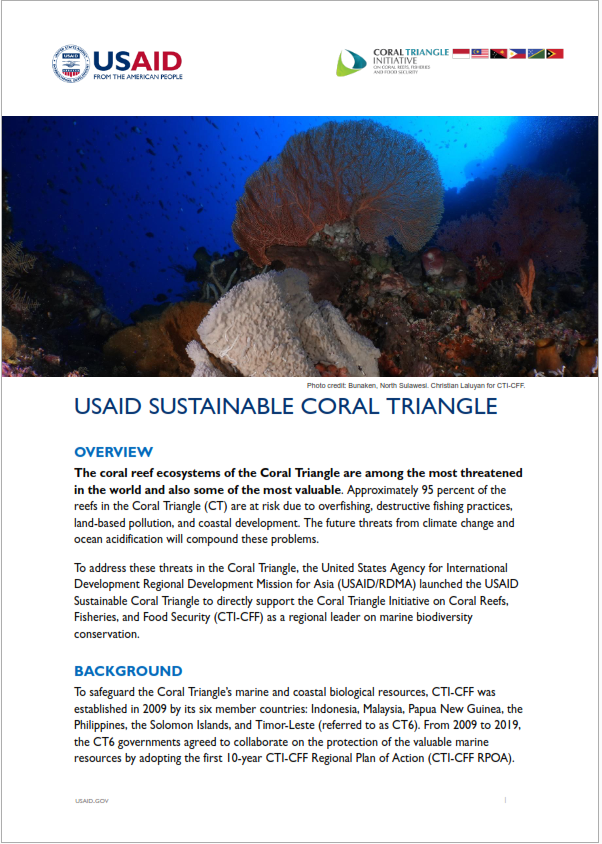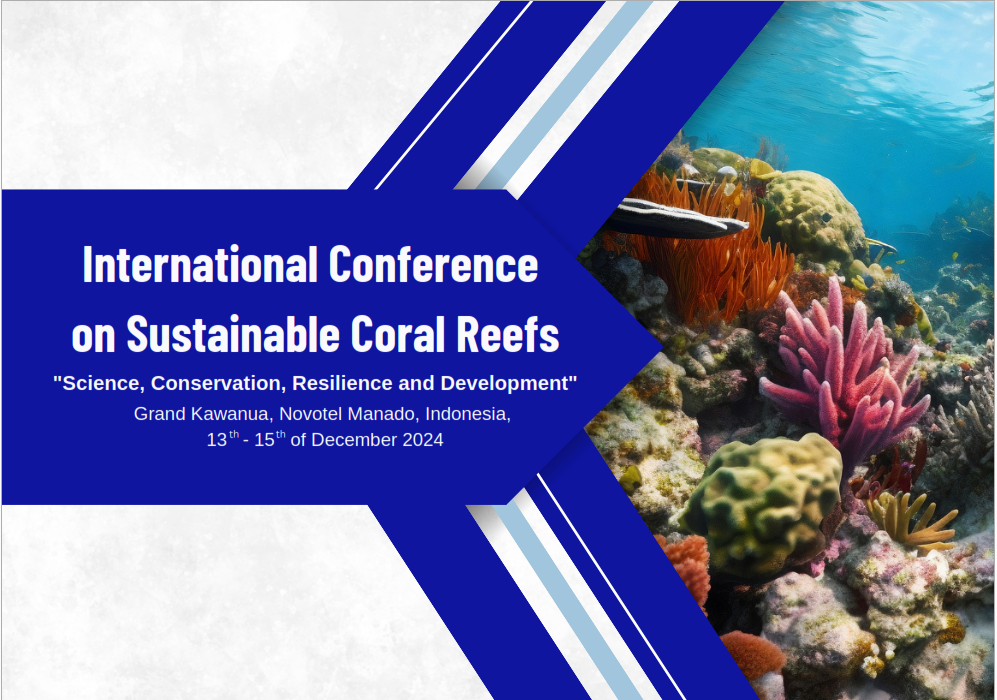Gender Equality and Social Inclusion (GESI) Regional Exchange: Advancing Inclusive Fisheries Management in the Coral Triangle
Gender Equality and Social Inclusion (GESI) Regional Exchange: Advancing Inclusive Fisheries Management in the Coral Triangle
On September 9-10, 2024, the Gender Equality and Social Inclusion (GESI) Regional Exchange (REX) took place at Novotel Bangkok, drawing participants from across the Coral Triangle and Southeast Asia regions. This landmark event was aimed at advancing gender equity and social inclusion in fisheries management and coastal conservation, a critical priority for the Coral Triangle Initiative on Coral Reefs, Fisheries, and Food Security (CTI-CFF).
The event, initiated by the USAID Sustainable Fish Asia Technical Support (SuFiA TS) in collaboration with CTI-CFF, commenced with welcoming remarks from Dr. Arlene Satapornvanit, Chief of Party (COP) of USAID SuFiA TS. Dr. Satapornvanit highlighted the importance of the gathering in addressing the often-overlooked challenges faced by women and marginalized communities in fisheries.
In his opening remarks, CTI-CFF Deputy Executive Director for Program Services, Christovel Rotinsulu, emphasized the significance of GESI in the Regional Plan of Action (RPOA) 2.0, reaffirming CTI-CFF's commitment to gender mainstreaming. He expressed gratitude for the support of USAID SuFiA TS in driving this initiative. Attendees of the event were representatives of various organizations supported by USAID SuFiA TS, including CT 6 country government officials involved in the CTI-CFF Women Leaders’ Forum Working Group. Others were representatives from various project supported by the USAID SuFiA
One of the primary objectives of the exchange was to gather input for establishing a regional GESI Hub. Envisioned as a platform for advocating for gender equality and social inclusion, the GESI Hub will work with regional organizations and private sector partners to enhance capacity-building initiatives. This initiative aims to support the integration of GESI in fisheries management policies, research, and grant proposal development, ensuring that underrepresented groups have a voice in the decision-making process.
CTI-CFF believes that by mainstreaming GESI, fisheries and coastal management efforts can become more inclusive, fostering equitable access to resources, participation, and benefits for all community members. CTI-CFF established the Women Leaders’ Forum (WLF), who has been assisting women groups in coastal areas of the CT 6 countries, in their participation in fishery production as well as management of the local conservation areas.
Endorsing GESI recognizes the unique knowledge and roles of women, indigenous peoples, youth, and other marginalized groups, whose contributions are critical to achieving sustainable and resilient coastal ecosystems. Additionally, GESI mainstreaming helps address social and economic barriers, promoting fair opportunities and reinforcing community resilience against environmental and climate-related challenges.
Key Discussions: Gender, Fisheries, and Climate Change
The first day of the event featured a session led by Jasmin Saad on the intersection of climate change, fisheries, and GESI. The session illuminated the vital role women play in fisheries, especially in post-harvest activities, and the disproportionate impact of climate change on marginalized communities. The participants discussed how women, who make up a significant portion of the workforce, are often underrepresented in decision-making roles—holding less than 15% of such positions in the Indo-Pacific region.
The exchange also addressed the issue of gender-based violence (GBV) in fisheries, highlighting the disturbing trend of "sex-for-fish" and other exploitative practices. Climate change, which exacerbates social and economic inequalities, was a recurring theme throughout the sessions, emphasizing the urgency of gender-sensitive policies in mitigating its impacts on vulnerable communities.
Sharing Success Stories and Identifying Challenges
Representatives from Indonesia, Malaysia, Papua New Guinea, Timor-Leste, Thailand, Lao PDR, and Vietnam shared their national experiences in integrating GESI into fisheries management. Success stories included Indonesia’s “Patin Pustina” fishery village and Malaysia’s gender mainstreaming initiatives in aquaculture. However, challenges remain, such as limited representation of women in leadership roles, cultural norms restricting their participation, and gaps in access to education and economic opportunities.
Many countries across the Coral Triangle and Southeast Asia continue to experience significant gender imbalances due to deeply rooted cultural norms and social structures that restrict opportunities for women and marginalized groups. These barriers often limit access to education, resources, and decision-making roles, particularly in sectors like fisheries where traditional gender roles prevail. In many cases, women are concentrated in lower-paying, post-harvest jobs and are underrepresented in leadership and policy-making positions, leaving their contributions undervalued and their voices unheard. Addressing these imbalances requires targeted efforts to challenge cultural norms, promote gender equity, and ensure that marginalized groups have equal opportunities to participate in and benefit from sustainable development initiatives.
Recognizing the need to build participants' capacity to incorporate GESI principles into their work, the event also included practical workshops, such as a session on proposal writing led by Professor Kyoko Kusakabe from the Asian Institute of Technology. Participants learned how to integrate GESI principles into project proposals, emphasizing the importance of gender analysis, stakeholder inclusion, and the development of gender-responsive indicators.
Looking Ahead: The GESI Hub’s Role
The second day of the exchange focused on collaborative discussions for the establishment of the GESI Hub. Through interactive sessions using platforms like Slido, participants shared their insights on how the Hub could achieve sustainability, what channels it should use for communication, and how it can drive long-term impact.
The event concluded with two panel discussions featuring women leaders from across the region, who shared their experiences in navigating challenges and promoting GESI in the fisheries sector. Speakers on those panels were Laura Whitford, Director of Conservation Partnerships Asia Pacific of The Nature Conservancy, Ms Joannie Jomitol, Project Team Leader (Tun Mustapha Park) of WWF-Malaysia (Marine Program), Ms. Dinna Umengan, Tambuyog Development Center/SEAFISH Executive Director/Regional Coordinator of Philippines, Ms. Agnes Saul, CTI-CFF Youth Ambassador Cohort 2023, Ms. Elsie Mae A. Solidum, Assistant Regional Director, Department of Science and Technology Region 11, Davao, Philippines, Ms. Glycel Formentira Miñoza, Communication Associate of IMPL Project, and Ms. Haidisheena Allama, Attorney IV/Chief Legal Officer, Ministry of Agriculture, Fisheries and Agrarian Reform (MAFAR) in the Bangsamoro Autonomous Region of Muslim Mindanao. The panels were moderated by Ms. Nguyen Thu Hue and Ms. Jasmin Mohd. Saad.
The GESI Hub is expected to play a critical role in promoting equitable and inclusive policies, enhancing the livelihoods of women and marginalized groups, and ensuring the long-term sustainability of fisheries in the Coral Triangle and beyond.



